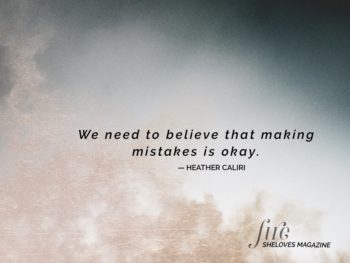
As a kid, I hated writing.
In sixth grade, my teacher called in my mom for a parent-teacher conference over the state of my journal. Mrs. Kimmerling required a page a day. There was a space above for drawing a picture, and a space below for writing anything you wanted.
We were graded on the number of pages, not quality. Easy, right? But in my journal, page after page after page was blank.
I simply couldn’t do it. Every day, that journal terrified me.
I’m sure my parents and Mrs. Kimmerling scratched their heads. After all, I was good at writing. Was I Iazy? Did I not understand how important it was to complete my assignments?
My shirking wasn’t unusual. I’d started not ‘living up to my potential’ in third grade. There was a lot of chaos in my family back then; I just didn’t have the energy to be excited about fill-in-the-blank workbooks, book reports or multiplication tables.
For a normally compliant, successful kid, it was a big deal.
I even checked out of understanding why I was checking out. I didn’t connect the dots between family chaos and school trouble until a decade and a half later.
But in sixth grade, I realized being a slacker felt more stressful than compliance. It was stressful to bring home bad grades, procrastinate on projects, and not please my teacher and my parents.
So when time my mom brought up the journal, I decided it was time to get with the program. I started forcing myself to write.
At the time, I was in a musical called S.O.S.: Calling the Children of Planet Earth. I played Spike, a loveable but street-smart foster kid whose heart is softened by music and an encounter with two space aliens.
I know, right?
Instead of writing about my day, I started writing short scenes involving different characters from the play. Not just Spike—several of the foster kids. I wrote in first-person voice, telling parts of their stories.
And this is where you’d think the budding writer would discover a love for her craft.
But you’d be wrong.
One day, flipping through the pages of my journal, I looked at my stories critically. The characters were expressing anger—rage, really—at the adults around them. They said out loud how upset they were at the grownups in charge.
They sounded like they were written by someone who was angry with her parents.
A deep fear seized me.
That territory was dangerous. Way too dangerous for a school assignment. Suddenly, I understood why I hated those blank pages.
They might force me to tell the truth.
My role as a kid in my family was to be okay. Successful. Happy. Quite literally, I performed: I starred in musical theater and commercials, I sang, I danced. While our family imploded, I was proof that everything was under control.
My parents loved me. I knew that back then, and still do. But families work this way, don’t they? Love doesn’t prevent dysfunction from taking hold.
To go against the script of performance was terrifying. It was uncharted territory.
Naked Honesty By Accident
In college, I thought being more Christiany would solve my problems, would get rid of the anger, would fix everything.
Recently, I went through some college prayer journals. I hadn’t read them since because I suspected they would be tedious, without even juicy gossip to help. (Juicy gossip wasn’t Christian).
Reading the journals, expecting religious woolgathering, I was struck by my occasional naked honesty.
About a Christian conference I was about to attend, I wrote, “I desire to see You busting out all over the place. But I feel like I’m going to the dentist. I feel like my lack of enthusiasm will be pointed out.”
Or this, about why I usually procrastinated about my quiet time: “What am I scared of? What am I avoiding? Why don’t I run to You?”
That, my friends, was the million dollar question, wasn’t it?
I don’t remember having these thoughts in college. I don’t remember questioning my script at all. But when I wrote things down, I was honest despite myself.
A paper fell out of the journals while I was paging through. It was a lined yellow sheet, undated. I must have written it around Christmastime after I graduated from college, when I finally went to therapy to deal with my depression, when I started facing my anger towards my parents, when all my coping mechanisms was stripped away.
Here’s part of what I wrote: “I hate this half-life and nothingness. I hate myself. I hate my life. I would rather not live this anymore. I would rather not, thank you.”
I find a bit of black humor in this: even at my lowest, I was polite.
God, coming across that paper scared me. It scared me to remember how close I was to suicide. It scared me to see that naked unhappiness on the page. It scared me to remember being that unhappy.
Facing the Hated Blank Page Saved Me
All through my childhood I hated and feared writing because I sensed I could not handle its power. I avoided it because writing opened my heart to truth, and I couldn’t afford that kind of honesty.
But when I was finally able to face the blank page, it saved me. Those awful thoughts—like that almost-suicidal scrawl—freed me. I faced what I was feeling for the first time in my life.
I wrote my way out of that depression.
I couldn’t pray. I filled paper instead. I seized on writing as the purpose of my life, getting books on craft, doing morning pages, going to workshops and classes that I could afford. The very thing I had avoided so long became my life raft.
The Keys to our Heart Hide in Our Hates and Fears
Our hearts are strange creatures. They long for what they need with a kind of rabid intensity that scares the more settled parts of our brain. Those things we hate and fear might be the very keys that unlock our spirit. The passion of hatred is a clue. It tells us that there is a volcano under the surface. It tells us to tread carefully, because we are on sacred, unsteady ground.
What are you afraid of? What do you hate? The Bible? Church? Intimacy, sex, spiritual disciplines, new habits, places?
I’m not saying that you should jump into these things, that your hatred or fear should be ignored. No: I’m just saying that it’s something to consider. Something to test gingerly. Something to lift up to God and ask Him for discernment about.
Have you touched the roots of your avoidance with gentle fingers? Have you traced the path back to the source? What will you find when you do?















“Those things we hate and fear.” I find so many touchstones in what you have written, Heather. I fell quickly into patterns of conformity and superficiality in Grade 5 because I figured out that what was expected in class assignments had little to do with the truth I could tell. In university I learned how to analyze the writing of others, adding an enormous burden of perfectionism to my required essay writing, which could not be tossed off as easily as, say, sentiments on the autumn leaves. My writing was laborious, slow, confused, and usually late as I floundered and procrastinated. My longing for self-discovery was expressed in my senior year as I finally dared to write a poem: https://northernlightbooks.ca/dir/poems/to-write-a-poem I soon would adventure further to let God show me the doors to my dim and dusty caverns of true memories in a life confession beginning with memories when I was about one year old. Yes, a child that young can hate, fear, envy, and feel confusion and disappointment. As the flow of words gained momentum, I became able to analyze their sources and the images literal and symbolic that accompanied them. Then, I learned to distinguish a Voice from among all voices that spoke words and showed images attached not to the past but to the future, not just about me but for others. Glimpses. Puzzle pieces. Through a glass, darkly. Awesome clarity. Essentials for the journey.
I love this look into your journey into writing. And how easily we can be led away from the depth of our selves. Thank you for sharing your story here!
“Being led away from the depths of ourselves” is to some extent healthy. Normal people have a subconscious to which they ideally have considerable (but imperfect) rational access. Time cannot heal emotional wounds unless forgetting is possible.
Audio-processing deficits in the right ear may prevent a person from having a subconscious to run away into. People with too great access to their right brains are unable to escape from their memories. They lack the powerful stream of sound energy through the right ear to the left brain that is the means of integrating left-over-right brains. The left ear usually helps to organize the emotional experiences in the right brain. The left, rational brain draws on that organization while prioritizing for remembering, forgetting, and repressing memories. Thus, you have someone like Robin Williams and other bipolar (manic/depressive) people aware of incessant “chatter” in their brains of the type he was able to verbalize. They are conscious of the entire burden of their life’s experiences at all times, which means they can mix and match them comically as well as draw on prodigious amounts of information (e.g., “Rainman”). Some, like the standup comics, try to dissipate some of that emotional burden through laughter, which for normal people re-sets the integration speed of the cerebral hemispheres — although not necessarily for the comedian who elicits their laughter. Depression, including suicidal depression, usually is caused by specific deficits of the left ear that impoverish the right brain’s emotions. Generally, either ear (or both) can be healed through stimulation with high-frequency sound. Substance abuse, which further harms the muscles of both middle ears, further deprives the brain of the flow of sound energy that creates strong left-brain dominance of the right brain and organized emotional experiences that the left brain can call on rationally. You can find much more about how the ears control what the brain can do at my blogs.
This is interesting, Laurna. I hadn’t thought about what exactly bipolar disorder would feel like, but your description here really makes me ache for people who experience it. I grew up very much repressing everything–and re-accessing all of that has been tremendously powerful and wonderful. But I can very much see that having access to it all the time, without being able to exert any sort of control over it would be exhausting and depressing.
I am more like you, Heather. Uncovering what I had repressed gave me power. And that action works to some extent even for a schizophrenic like our son Daniel. His brief confession to me one night actually ended a long episode of schizophrenia; although I would not understand for years why that worked. However, the more fundamental need is for the ear to be able to carry sound normally into the brain. Anything that blocks the smooth integration of the two halves of the brain dys-integrates the halves of the brain; and also literally disintegrates the left half of the brain if that situation continues long enough. A physical blockage can be from wax in the ears or a bony growth in the ear canal or the breakdown of the muscle in the middle ear e.g., from infection. That muscle also can stall for reasons we call “psychological,” as when a person “blocks out” unwanted sound. If the muscle is weak, some sound will be blocked from transmission and people will misinterpret the “blocking” as deliberate. Or they won’t realize that the person’s behaviour is caused by a special type of “deafness” that can include extremely sensitive hearing (hyperacusis) that distorts sound flowing through the ear. When I discovered that pouring sound into Daniel’s right ear for 2 hours per day was making him “more left-brained,” it wasn’t a long step to discovering that left-brain dominance is what most people experience and is what establishes the “norms” of behaviour — including having a subconscious. The shocking thing is that ears can be strengthened about as easily as eyes can be corrected with glasses. More easily, really, because once the muscle works, sound flow tends to keep it strong just like any other exercise program for muscles. We could wipe out learning problems, all mental illness, suicidal depression, and a huge range of physical problems that rely on “timing” in body mechanisms if we were to test kids in school and stimulate their ears for a couple of weeks, paying attention to which ear needs to be prioritized. Usually both ears could use some fine-tuning but one of them may need to be approached first. Also, these problems provide a platform for Alzheimer’s and other problems later in life. We are learning that even moderate to severe Alzheimer’s reverses if the person sings. That is also why singing God’s praises lifts mood; but you must do it regularly and amplify the sound if you want to cure a serious mood disorder. If you know anyone with a mood disorder, learning disorder, autism, etc., please point him or her in my direction!
Powerful story, Heather. And asking some really good questions that I need to reflect on. Thanks for writing!
thanks, Sarah!